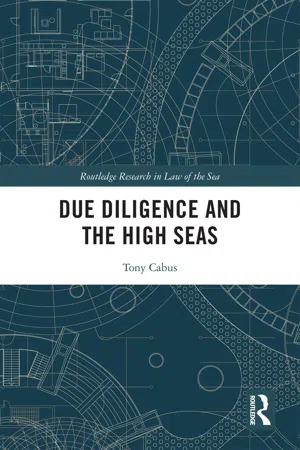
- 176 pages
- English
- ePUB (mobile friendly)
- Available on iOS & Android
Due Diligence and the High Seas
About this book
There has been a rapid growth of interest in due diligence, especially in the fields of environmental law and the law of the sea. Yet, confusion seems to surround this notion. Is due diligence a principle, a rule, a standard or something else? This book firstly explores thoroughly the concept of due diligence, its purpose and its mechanisms in order to propose a comprehensive theory of due diligence in harmony with the general law of State responsibility.
In the meantime, this book also explores the usefulness of due diligence to address modern challenges afflicting the high seas. Indeed, while the application of due diligence in transboundary contexts is well illustrated by jurisprudence, its applicability in areas beyond national jurisdiction remains unclear. Yet, a proper usage of this concept may be crucial for the protection of the high seas, as it allows for the intervention of international standards in this fragile area. Hopefully, the concept of due diligence can help compensate the insufficiencies of the United Nations Convention on the Law of the Sea concerning the high seas.
Examining in detail the theory of due diligence, this book will interest international lawyers concerned with this notion. It also offers a new perspective on the UNCLOS through the prism of due diligence and will interest lawyers dealing with the protection of the marine environment and fisheries.
Frequently asked questions
- Essential is ideal for learners and professionals who enjoy exploring a wide range of subjects. Access the Essential Library with 800,000+ trusted titles and best-sellers across business, personal growth, and the humanities. Includes unlimited reading time and Standard Read Aloud voice.
- Complete: Perfect for advanced learners and researchers needing full, unrestricted access. Unlock 1.4M+ books across hundreds of subjects, including academic and specialized titles. The Complete Plan also includes advanced features like Premium Read Aloud and Research Assistant.
Please note we cannot support devices running on iOS 13 and Android 7 or earlier. Learn more about using the app.
Information
1 The Historical Development of Due Diligence
Introduction
Section 1: The Early Development and Evolution of the Concept of Due Diligence: From Early Theories to the ILC Codification
1.1 The Theoretical Roots of Due Diligence: The State’s Responsibility for Acts of Private Actors
1.1.1 The Tribal or Collective Concept of Responsibility
1.1.2 Grotius and the Irresponsibility of States for Acts of Private Actors
Table of contents
- Cover
- Half-Title
- Series
- Title
- Copyright
- Dedication
- Table of Cases
- Table of Materials
- Acronyms
- Acknowledgments
- Introduction
- 1 The Historical Development of Due Diligence
- 2 The Contemporary Conception of Due Diligence: Clarifications and Constitutive Elements
- 3 The Viability of Due Diligence on the High Seas
- 4 Defining Due Diligence: From Interpretation to Law-Making
- Conclusion
- Annex
- References
- Index